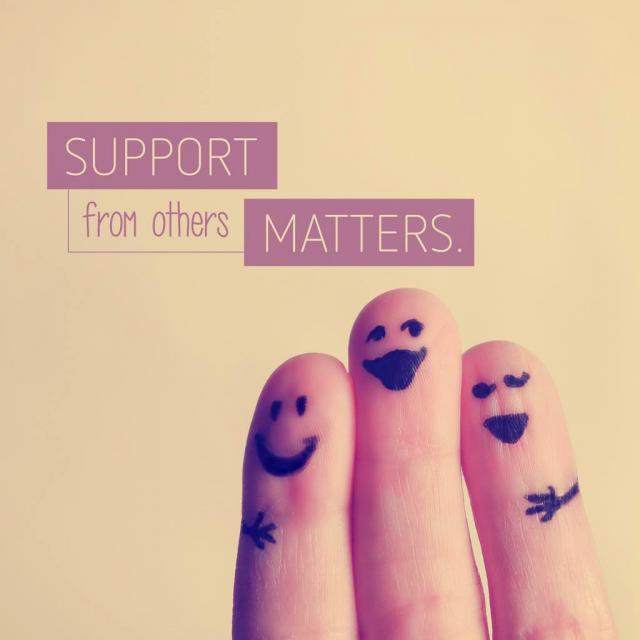Surrounding yourself with positive support can make it easier to quit. Find out what you can do to create a network of smokefree support.

Telling the people in your life about your choice to quit smoking and asking them for help can make a big difference. It’s likely that people will be supportive and positive when you tell them you are quitting smoking. But, you may come across others who don’t understand or who don’t want you to quit. Learn how to deal with the different ways others might react.
Know Who’s on Your Side
Surrounding yourself with people who support your choice to quit will increase your chances of staying smokefree for good. Your family, friends, co-workers, and others can help celebrate successes with you, boost your mood, and distract you from picking up a cigarette. But, what if people you care about don’t seem supportive when you tell them you are quitting?
See if these types of people seem familiar, and learn how you can deal with their different reactions.
Non-smokers Who Don’t Get It
People who have never smoked might not understand how difficult it is to quit. They might think that smoking is just a “nasty habit.” Or they might say things that can make you feel bad if you slip and have a cigarette or you start smoking again. It might be hard, but try to be patient with these people. Here are some more ways to deal with non-smokers who may not understand:
- Tell them how to help: Say exactly what would make you feel supported. You could say, “It would help me a lot if you celebrated my smaller smokefree victories with me.”
- Be positive: Thank them for their help and tell them how important their friendship is.
- State your feelings: Tell them how you feel when they do something that bothers you. For example, “It makes me feel bad when you talk about a time when I’ve slipped.”
Smokers Who Don’t Want to Quit
Staying friends with smokers who aren’t ready to quit can be one of the hardest things you do while you quit, especially if you smoked together. Even if they’re supportive, it can still be hard to be around them because they might remind you of smoking. This can trigger you to want to smoke. Below are some ways you can stay strong and focused on your goal. Try this:
- Respect them: Tell them you respect their choice not to quit and let them know how important your relationship is.
- Respect yourself: Talk to them about how important quitting is to you and what you’re struggling with, like being around cigarettes and cigarette smoke.
- Work together on a plan: Decide on smokefree zones in shared spaces, and when you’re together, ask them to smoke outside. Try to meet in smokefree places.
Smokers Who Aren’t on Your Side
There may be people who aren’t ready to quit and don’t want you to, either. They smoke around you and leave their cigarettes out, even when you ask them not to. They may even tell you that they don’t think you can quit. This can be discouraging and frustrating, especially if it’s someone you want to, or have to, keep a relationship with. You may need a break from this person, but that isn't always possible or easy. If you can’t give yourself some distance, try one of these other strategies:
- Remind yourself why you’re quitting.
- Join the Smokefree Women Facebook group and connect with other women who will support you.
- Plan to spend time with this person in places where smoking isn’t allowed (malls, movie theaters, restaurants), or find smokefree places you enjoy going solo.
- Lean on the people who are supporting you when the going gets tough.
Social and Smokefree
When you quit smoking, you may need to make a few changes to your regular activities to avoid smoking triggers that could lead to a slip. You might be worried that these changes will affect your social life. Luckily, you can still do things you enjoy while working on quitting:
- Try to socialize with people who support your decision to quit, especially in the first few weeks after quitting. This period can be hard and seeing others smoke can be a trigger.
- You and your friends have plenty of things in common besides smoking. Remind yourself of what those things are and incorporate them into your social life.
- Spend time with people who make you feel good about yourself and want you to succeed.
You may need to avoid certain places while you are quitting—like bars, certain concert venues, or areas where groups of people are smoking. Explain to your friends that this change is temporary and that you're not avoiding them, but are avoiding situations that might make you slip.
Buddy Up
If there’s someone close to you who smokes, ask them if they want to quit with you. It could be helpful to have someone who understands the challenges of becoming smokefree. Plus, you’ll have a built-in support system. If they’re not ready to quit, be understanding. Tell them that becoming smokefree is really important to you. Ask them to help you reach that goal by not smoking around you or letting you bum a cigarette, no matter how badly you may want one.







